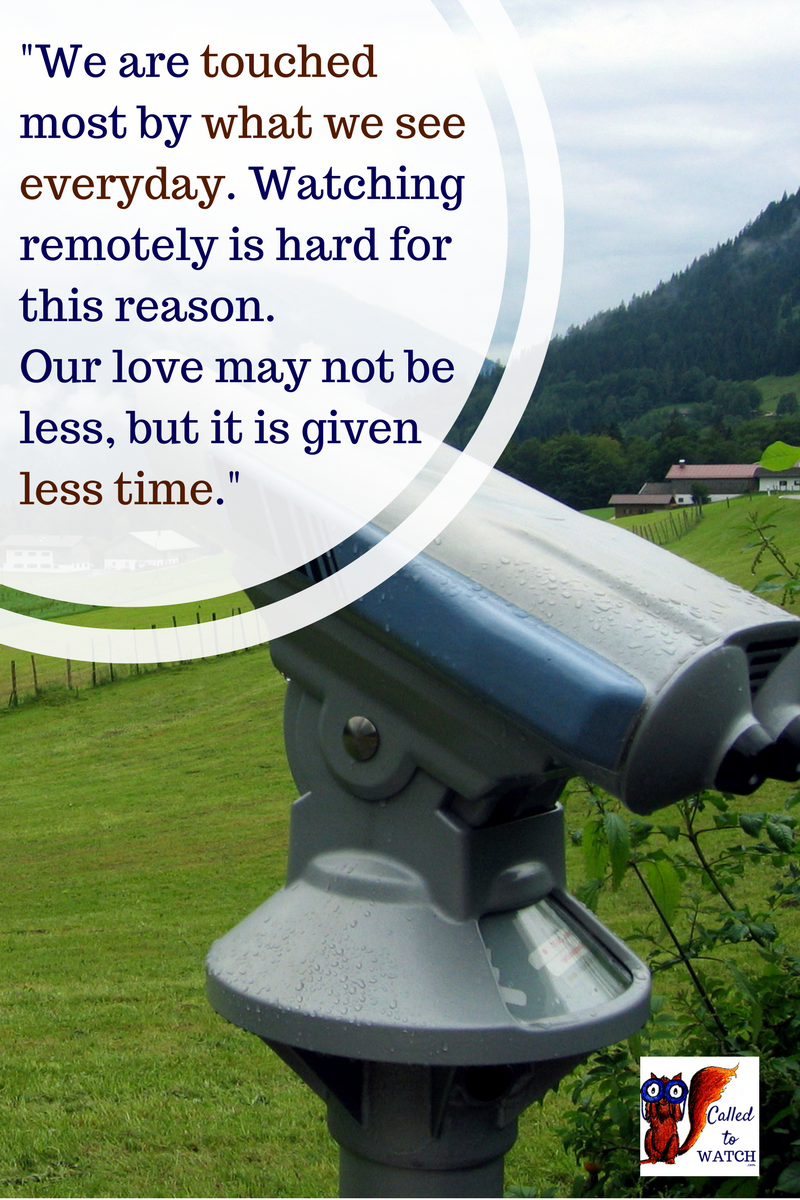Watching from a distance feels less ‘real’
What we experience personally seems more real, not only because we are a firsthand witness but because it actually disrupts our life.
Thus, it is more difficult to Watch when we do not see our Loved One regularly. It is genuinely hard to place as much importance on their struggles.
Not because our love is less, but because it makes up less of our day.
What should we do?
There is only one solution.
We must actively confront ourselves with their suffering.
We have no choice when we are residing close by, but now that we are further away we must consciously and regularly choose to see their pain.
Let us make phone calls or send emails or texts in order to keep up to date with their lives. After all, it is hard to remember when their next appointment is when we don’t have to physically drive them to the station.
Let us schedule time into our lives to bring them to mind and pray for them.
Let’s try to remain in constant dialogue. This is hard. It takes more effort than ‘normal’ Watching because it’s avoidable. It is not forced upon us; it’s a choice.
It often involves a juggling act of time and motivation and common sense.
But it’s possible.
When we Watch from a distance we may not understand.
Sometimes words alone just don’t cut it.
A wealth of knowledge is communicated through silence, through body language and through simply being with a person during the ups and downs of everyday life.
When we are living far away from our Loved One we simply cannot understand their day in the same way as if we had lived through it by their side.
We may intellectually understand what they are telling us – but we can’t palpably feel the despair, see the little wrinkle above their eyes, the straining of their fingers, the momentary disappointment when their ‘good day’ is eaten up by pain or their passing hurt when someone doesn’t notice they are missing from a gathering.
What should we do?
What can we do? We are not superhuman.
Yet we can genuinely take the effort to try and understand and feel what they are telling us. Perhaps we can attempt to visualize the situation.
It takes effort and concentration to listen properly to each word that they say. To not just nod and grunt and let our mind drift to other things as we hold the phone to our ear.
Let us pray for aid – pray for ourselves as much as for our Loved Ones.
Let us be eager to admit we do not and cannot understand fully, yet still be willing to try. This takes humility. And perhaps, when all is said and done, understanding is less important than love.
Perhaps we don’t have to understand completely in order to sympathise and commiserate.
Perhaps it is enough to pray and try.

As we Watch from far away we can feel left out.
The truth is, we are ‘left out’.
We used to be so entwined with their lives, so involved in their daily struggles – and when we move away this ends.
We will miss out on things. On events, on details, on facts and updates and reports. Information is always lost in communication. We will be excluded from their misery and also their triumphs.
We cannot weep and we cannot celebrate. And others can.
This hurts.
What should we do?
Remember we are not defined by our status as a Watcher.
Our value is not in how useful we are, how involved we are. A non-Watcher is no less important than a Watcher.
A remote Watcher is no less valuable than a close Watcher. We are what we are. Let us embrace every situation in life as a means to honour God and love our fellow men.
Let us pray continually for contentment.
Watching remotely leaves us feeling extremely helpless.
After all, we are doing a lot less for them than previously.
We are constantly receiving reports and updates, and yet are left no room to respond. Watching from a distance becomes more ‘one way’ than ever before, and this is difficult.
It can leave us feeling absolutely useless, and this can result in guilt. We may feel like we are failing in our role as a friend, a mother, a brother.
Their sickness can seem even more depressing – because we often hear the bad news more frequently than the tiny, unmentionable, perhaps unnoticed, victories.
What should we do?
Perhaps we need to remind ourselves that Watching by itself doesn’t save anyone.
We cannot change the situation; our role is not to rectify it. God alone can do that, and He is still working in our Loved One’s life, regardless of whether we are present. Let us turn to Him in prayer and faith as the needy, helpless people that we are.
It is in His hands.
Should we Watch from a distance?
It’s a difficult choice to make.
Watching from far off is a continual series of decisions.
Will I ring them this evening even though I’m exhausted from work? Does it really matter if I text them or not this morning? I need a break; perhaps I can go another month without visiting.
There are no right or wrong answers – but we all know what love looks like.
What is important is that we do not go into remote Watching full of misplaced expectations.
Instead, let us enter the situation prepared to struggle, prepared to sacrifice, prepared to be lonely, and prepared for victory.
Lestrade: “’I’ve been doing some reading to find out how bad it [M.S.] gets.’
Joan: ‘It gets bad.’
Lestrade: ‘I realised something like this [beginning a relationship with a chronically sick woman], well, it doesn’t count unless you go in with your eyes wide open.
And I mean, wide open.’”
-~ Elementary, Season 4, Episode 15, “Up to heaven and down to hell”
// Do you Watch from a distance? What do you find hardest? How do you cope? Do you wish you could Watch from a distance? Why?
Share your thoughts below!
In Part 1 of this series we looked at the fact that it is hard to help out physically when you live a long way away.
PS: Enjoyed the post above? Get the next one delivered straight to you! Sign up for email notifications
I’m also on Facebook, Pinterest & Twitter! Meet me there for more interesting reads, resources and community.

